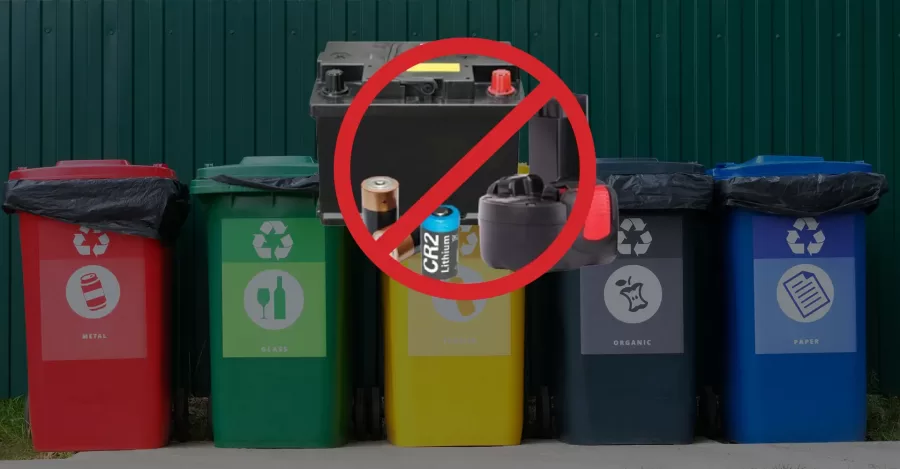Lithium-ion batteries have become commonplace in our everyday lives due to how convenient and efficient they are at powering everyday devices. But what do you do when your battery is no longer working? In this article we’ll break down about lithium ion battery disposal: why you can’t throw a lithium-ion battery in the trash and how to dispose of it properly.
Why You Can’t Put Your Lithium-ion Battery in the Trash?
You absolutely cannot throw a lithium-ion battery in the trash because it would present serious hazards such as trash fires or environmental contamination. Here are the lithium-ion battery disposal hazards.
When damaged or improperly sealed batteries come in contact with water, the chemical reactions can cause fires. Fires can also be caused by short circuits of batteries that still hold a residual charge.

Lithium-ion batteries also contain heavy metals and chemicals that are environmental hazards. These dead batteries can leak cobalt, manganese, and nickel as well as lithium salts and plastics that can contaminate the environment over time. For example, chemicals like leachate can leak out and contaminate groundwater.
How to Dispose of Lithium Ion Batteries?
The only proper way to dispose of a lithium-ion battery is to get it to a proper electronics recycling center, which you can find on your local government website. You can bring your battery to a physical location yourself, or hire an expert to come with the proper equipment and dispose of it for you. The latter might be preferable if you’re planning on throwing away large quantities of batteries regularly.
If you are going to dispose of your batteries on your own, follow the following instructions for safe handling:
- Check the disposal instructions for your specific battery. These instructions should always supersede any you find online, as they are specific to your battery.
- Wrap your battery in tape, and make sure to cover the battery terminals.
- Seal your battery in a plastic bag, to avoid exposure to liquids as much as possible.
- Store your battery in a dry, cool place. Extreme temperatures can cause further damage, leading to dangerous situations.
If your battery is clearly damaged or showing signs of danger, try using a lithium-ion battery drum. These drums or drum kits come with fire protection and cushioning to prevent further damage. They are also sealed to be waterproof, preventing chemical reaction fires. This is the safest way for damaged lithium ion battery disposal, if possible.
The Lithium-ion Battery Recycling Process
Once your battery is properly recycled, it gets evaluated for repair or reuse. If it is deemed reusable, it is sent to the appropriate place for refurbishment or consignment. If it is not reusable, the battery is shredded and the hazardous materials are removed safely. Materials are recycled, such as the cathodes and anodes which are used to make new cathodes and anodes.
Follow this process to ensure safe disposal of your lithium-ion batteries, and visit our blog for more safety tips on how to handle lithium-ion batteries.



2 thoughts
Есть более простое решение, надо обязать производителя авто продавать вместе с машиной инструмент для ручной разборки аккумулятора типа домкрат и обязать водителя скажем через 15лет должен будет сдать столько то элементов сколько уходит на его марку авто батарей. И огромную сумму для не сдачи, тогда владелец авто если сам не захочет то сможет нанять разнорабочего для этого. А если продаст авто то без учёта этого инструмента поставить запрет,
Итог с завода инструмент с владельца указанная масса элементов аккумулятора и кстати эту массу с возможностью сдавать постепенно с учётом выхода из строя аккумуляторов, они же не все в один день выйдут из строя
Однако, реализация такой системы может столкнуться с несколькими проблемами.
Сложности с обеспечением совместимости: Различные модели автомобилей могут иметь разные типы аккумуляторов и методы их установки. Обязывать производителей предоставлять один универсальный инструмент для всех моделей может быть затруднительно.
Стоимость и сложность установки: Даже если предоставить инструмент, требующийся для ручной разборки аккумулятора, это может быть сложным и опасным для обычного водителя. Требовать, чтобы каждый владелец автомобиля умел и имел доступ к таким операциям, может быть нереалистично.
Сложности в контроле и обеспечении соблюдения: Контроль над тем, сколько элементов аккумулятора сдаёт каждый владелец, может быть сложным. Также могут возникнуть проблемы с проверкой корректности утилизации и соблюдения правил.
Финансовые барьеры: Накладывание штрафов на владельцев, не сдающих аккумуляторы, может быть финансово обременительным для людей с низким доходом, что создаст дополнительные социальные проблемы.
Вместо этого, решение может быть более эффективным через создание программ стимулирования для утилизации старых аккумуляторов, таких как субсидии или бонусы для владельцев, сдавших аккумуляторы на переработку. Также важно продолжать исследования и разработку более устойчивых и безопасных методов хранения и переработки аккумуляторов.